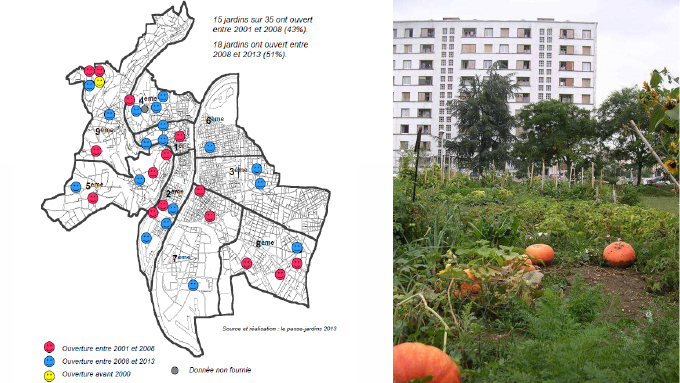Community garden charter
28th August, 2013
Contributor: Lyon
The City of Lyon and community garden stakeholders are co-writing a charter to define and to promote key principles and best practices. Following up a diagnostic made in the beginning of 2013, this document wishes to tackle various topics such as: governance, social link, health risks and polluted soil, food production, etc.
Concept/ Motivations
The city of Lyon counts around 28 hectares of collective gardens, including allotments (for personal/private use) and community gardens. Allotments mostly exist since the early 50’s, and community gardens have emerged during the last decade, due to citizen demand and public social policies.
About 2 000 people are involved in those gardens through various organizations: NGOs, neighbourhood committees, etc. and there is a big diversity of gardens: sizes, practices, purposes, constraints, etc. They can be settled on both private and public land.
A common guideline through diversity
The allotments are a heritage from the past, based on ancient public policies made for workers who came from the countryside to work in factories. Small plots were “given” to families to grow their own food. The city grew around those areas, and the situation toward the allotments users stayed quite unclear according to modern laws (private use of public spaces). Even if allotments count for 95% of the gardening land (26 Ha), they are seen as “private properties” and there is no view over volume and practices in the food production. However, the municipality wishes to initiate the change.
On the other hand, the city of Lyon has been supporting the raise of community garden. In 13 years, about 35 have been created, either by funding actions or allowing the use of public space by NGOs (with clear contracts). The original main purpose was to maintain or create social link, and promote the (re)use of public spaces, especially in deprived areas.
Regarding the success of the project, the city is now facing both a huge demand from citizens for new gardens and a wide diversity of stakeholders, needs and uses (such as growing food). To frame partnerships, define common principles and promote best practices, the municipality is working on a charter, with community gardens’ stakeholders. It is also based on the strong network of community gardens, the NGO “Le Passe-Jardins”.
Result
The creating process started end of 2012 with working on a diagnostic with the NGO “Le Passe-jardins”.
- 35 gardens (only 1 in 2000)
- 1.5 Ha
- 13 employees (4 full-time equivalents)
- 830 stakeholders
- 5 tons of food produced per year
- 35 different organizations
- Various difficulties or needs: drinkable water and power access, pollution, etc…
- Various purposes: social, educational, food, etc…
The Charter is an ongoing process. 4 workshops have been set up from April to July 2013 to draft the charter.
Common objectives:
- Adjust intern rules of gardens and public space occupation contract
- Enhance best practises through the network
- Stimulate an urban farming in Lyon
Main topics:
- Environment protection, Preventing health risks
- Social link, activities and access for all
- Governance
- Food production, resilience, food autonomy
So far, 13 commitments points:
Few examples:
- The garden is open to anyone if a NGO member is present
- Develop and experiment environmentally friendly practices (suppress pesticides, minimize waste generation and waste of water, recycle whatever can be recycled, etc.)
- The community garden takes part in the urban landscape as it is breathing and creating place in the public space.
- Jobs can be created in the community garden revealing realities of the agriculture jobs
- The garden can be seen as new urban food production areas. They can contribute to increase food autonomy.
Benefits
Diagnostic: better knowledge
Governance:
- Synergy with and between all stakeholders
- Support to experiment new governance models in NGOs
Develop eco-friendly practices
Strengthen social link
Pro and Contra
Pro:
- Gives a frame for both the city and the NGOs
- Based on free commitment
- Process based on workshops
Contra:
- A Charter is (only) based on free commitment
- Small impact regarding the amount of allotments
- Purpose stays on social link more than sustainable food
- Doesn’t help to find new space for new gardens
What are the lessons learn to be used/transferred/implemented in the other partner cities?
The community gardens network, Le Passe-Jardins, is essential to help creation and development of community gardens and to create a link between users and the city;
The diagnostic of the community gardens was a great help to identify specificities and needs.
The collective writing work strengthens local governance
Question to the network
- How could the community gardens growing food to feed the city? Is it a realistic vocation/interest? Do they not only exist to serve hobbies and social link?
- How to find/develop new space for new gardens? Use private land?
- How to make sure to avoid privatisation of public space?
- Could the gardeners to give the production to social grocery shops (legislation concerning health risks, etc)
- How to encourage the allotments in the same way?
References:
Hélène FONFREDE, Territorial Development Dpt of Lyon: helene.fonfrede@mairie-lyon.fr
http://www.lyon.fr/page/cadre-de-vie/respirez-/cultiver-son-bien-etre.html
http://lepassejardins.fr/spip.php?page=sommaire
